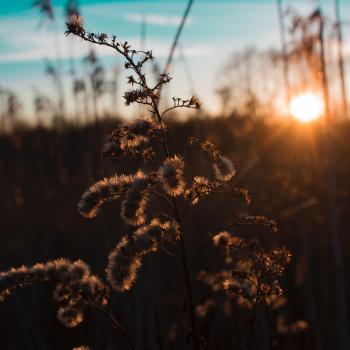
I think we’ve all had the fantasy about the big, elaborate shrine in a wild-ish place somewhere. We can see it in our mind’s eye – the natural stone, the altar, some vines creeping in a decorative-but-not-annoying way. Maybe we’ve even started on building one out in the yard, or on a nearby patch of unclaimed land. We imagine making our offerings there, in that perfect spot. It never needs weeding, the weather is always nice, the walk is always easy and the bugs leave us alone. Or maybe we plan a large altar for inside our house. Once we find a spot where multiple tiers of candles and magickal accoutrements won’t get dusty or attract the attention of little hands or curious felines. And we plan to really focus on our devotional practice then. Once the altar is set up. Once everything is perfect.
But then something happens. We get sick. Or we need to work more hours and don’t have as much down time. Or our obligations become overwhelming and at the end of the day, we’re just plain spent. Maybe we fight chronic pain, fatigue, or inflammation. So the altar never gets built, or never gets tidied up. We tell ourselves that we’ll work on it when we can – when we feel better, when we have time, when there’s a free weekend. And once that happens, then we’ll really focus on our spirituality. The days become weeks. The weeks become months. And now it’s another springtime, and we’re still waiting for the ‘right time.’
Sound familiar?
Through a thousand different sources, we’ve been bathed in the idea that spirituality and devotional practice is something that happens in a ‘special’ place that’s ‘perfect.’ We’ve been inundated with the message that the framework matters. Our favorite witch movies frequently include whole rooms dedicated to the Path, replete with artfully dripping candles and smoke from incense that just happens to be curling in lazy spirals toward the ceiling exactly at the moment the actors enter the frame. Our examples of ‘smells and bells’ rituals in real life are frequently those that happen in a church where there’s an entire building, team of people and budget allotment specifically for services and ceremonies.
It’s really hard to escape the pressure of what we think our spiritual practice *should* be in order to explore the possibilities of what our spiritual practice *can* be.
Rev. Carl Gregg, the minister of the Unitarian Universalist Congregation of Frederick, has a saying that I love: ‘Perfect is the enemy of good.’ Our perfectionism, our desire for using a special, unique space for spirituality, tends to slap a pair of blinders on us. We lose sight of the fact that the sacred is everywhere, in everything, regardless of the presence or absence of altar cloths, candles, crystals and magickal bric-a-brac. Those blinders can keep us from refilling our spiritual well when we most need it – exactly at those moments when we are exhausted, overwhelmed, ill or overscheduled.
A spiritual practice, at its very best, is a connection that supports us. It’s not meant to be an energy drain or to inspire guilt. Although elaborate altars and rituals are beautiful, they take a lot of work, and many of us simply don’t have the spoons to build the shrine of our dreams. The thing is, limitations don’t stop us from being spiritual people. They don’t stop us from feeling love for our Gods, our Ancestors, our Nature Spirits or our Sacred Selves. And I don’t think it shifts the way They feel about us. We don’t love our friends and family any less when they go through hard times. In fact, we tend to want to show up for them more in those spaces because we know they could use the extra help. I believe the Powers That Be feel similarly.
When things get really tough, I shift to a set of devotional practices that I think of as ‘bearing with-ness.’ They are ways to share space with the Powers That Be without generating a ton of fatigue in the process.
Divinitea:
Most of us have a cup of something warm and tasty in the morning – coffee, tea, hot chocolate, whatever gets you going. Invite the Powers you work with to share your experience of that daily cuppa. This is not Trance Possession – it’s an invitation to the Gods, Ancestors and Spirits to sit with you in your body without taking hold of the wheel. When I do this, I invite my Patroness to ‘sit’ in the right side of my body – I offer to Her the sensations of touch, taste and scent from that side. For me, the moment when She comes to sit with me is also wonderfully comforting. This practice can extend to other areas than a cup of coffee, as well – you can offer up meals and other pleasurable sensations to the Gods as shared experiences.
Prayer forms:
Although it’s awesome to light some candles and chant, sometimes just getting up and across the room is a challenge. For those days, I fall back on a prayer practice. I personally love malas – prayer beads – for this purpose. A mala is a string of 108 beads, but you could use pretty much any beaded necklace or bracelet. Hold the string of beads in your hand, and for each bead, say a couple words, or just your Deity or Ancestor’s name. You can do this lying down, while stuck in traffic, or silently while sitting in the doctor’s office. Maybe you add a little visualization here – when I do this, I visualize myself at my Patroness’s Hall, laying an offering to Her.
Rough days are also good places for litanies. A litany is a recited petition that’s usually repetitive – it’s the same every time. To use a litany, you do need to make a little space on your good days to learn one (or write one of your own). I recommend using a rhyming litany simply since it’s easier to memorize. Tape the litany to your mirror or desk, make it the background on your computer or phone, whatever you need to do to help you learn the words. Then, when a bad day hits, simply recite the litany softly or silently. You’re absolutely still making an offering here. The fact that it’s words and not, say, drumming while dancing around the living room, is totally fine.
For your viewing pleasure:
Many of us read or scroll through social media on low days. One way to shift the tone of those activities from mundane to devotional involves the content we’re looking at. The internet is a pretty good resource for mythology. Look up and read a story about the Pantheon you work with (or wish to work with). If your practice is more Ancestral, read about your Ancestors’ time period or country of origin. Not all day unless you wish to, but maybe for 10 minutes or so. One of my other favorite things to do is pull up an image search and look at depictions of the Gods I serve. There are some pretty decent hashtags out there as well. For example, the hashtag #cernnunos over on Instagram has over a thousand images associated with it, and many of the photos are very beautiful. The internet has its downsides, but our ability to share sacred imagery with each other has never been stronger. Take advantage of it.
Rest:
Remember that part of our role here, now, on this green earth in this changing time is to be the hands for those who cannot physically touch and the voice for those without human speech. The Powers don’t want us beaten down, exhausted and tapped out. They love us. It’s okay to rest. It’s okay to do nothing. As I am fond of telling my students, sometimes the greatest yoga is sleep.
So let’s make some good offerings. Not perfect ones.

















